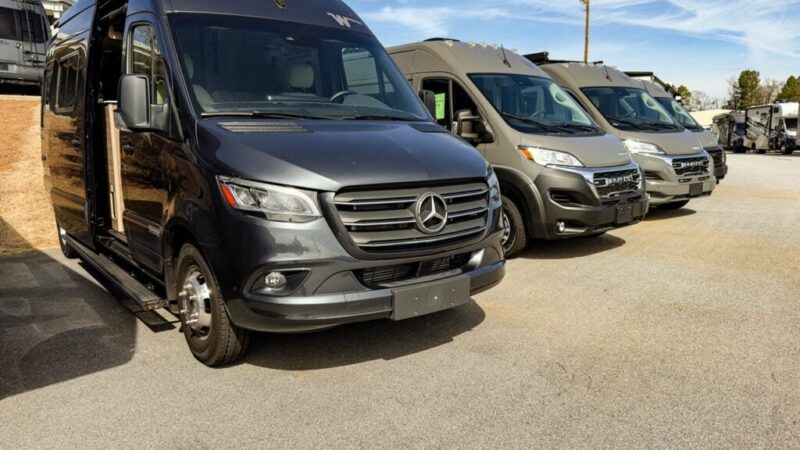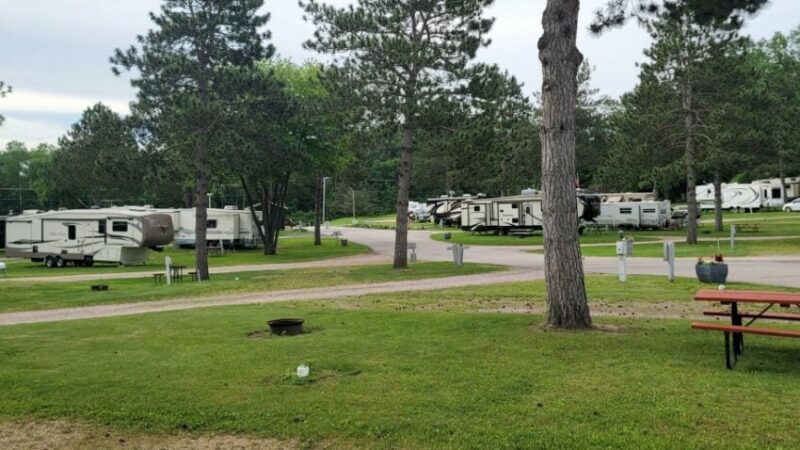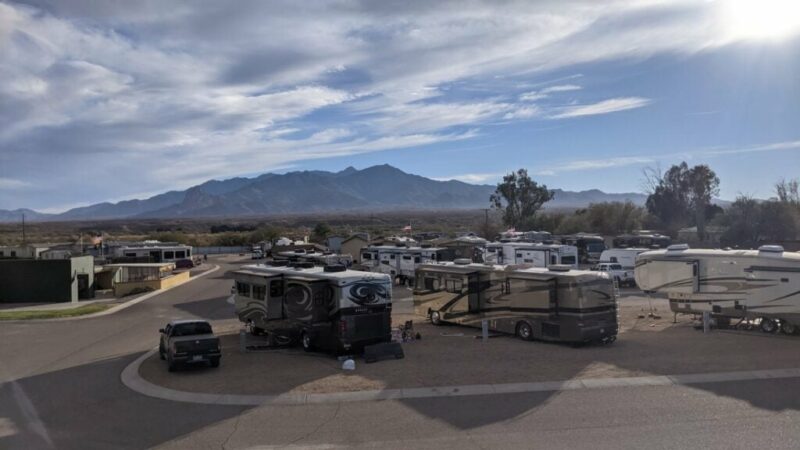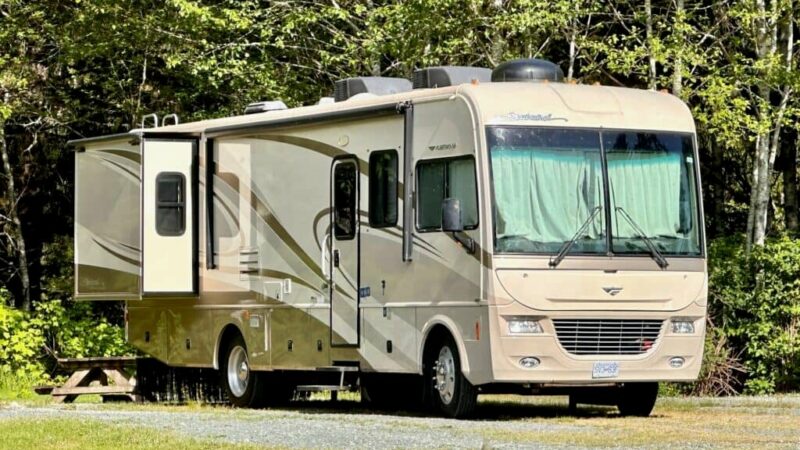How to Find Free RV Camping
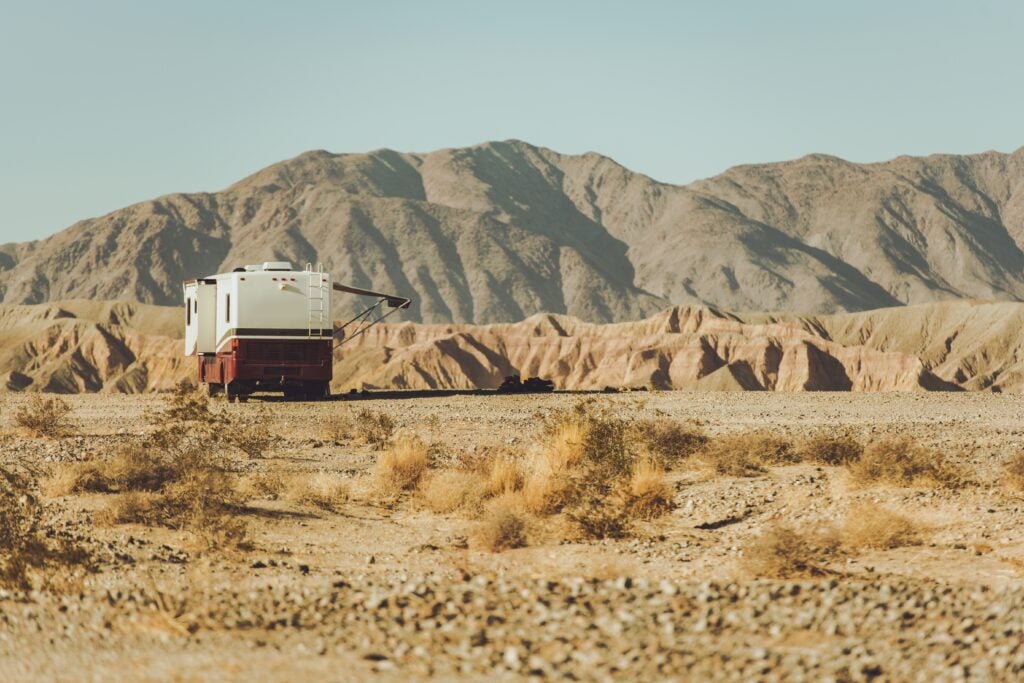
The Best Things in Life CAN be Free
If you’re planning an RV camping trip this travel season, you’re not alone. This year, an overwhelming majority of us already planning our summer RV camping adventures. The results of a recent survey conducted by Harvest Hosts confirms that 92% of RV enthusiasts plan to camp as usual this year. However, there’s no denying that ever increasing travel costs are making free camping options more attractive than ever.
Fortunately, there are plenty of free campsites throughout the US and Canada. Not only that, but a wealth of apps and online resources are making it easier than ever to find budget-friendly boondocking spots.
What You Should Know About Free RV Camping
A self-contained RV is a must
Nearly all free camping spots require boondocking. They’re almost always rustic and offer little (or nothing) in the way of services. Most of these spots are located in scenic areas and have fabulous views. Others aren’t as picturesque but are fine for an overnight on the way to somewhere beautiful. With all that being said, a completely self-contained RV is essential for making the most of your stay at most free campsites and is mandatory at Harvest Hosts and other membership-based free camping locations.
Find out what other campers are saying
Many free campsites are located in remote areas, accessible only by gravel roads that receive varying levels of maintenance. For this reason, it’s a good idea to research road conditions and campsite size before you get there. There’s nothing like finding out the road is washed out poorly maintained, or has low clearances when you’re en route. RV LIFE Trip Wizard is an invaluable tool for planning an RV safe route, wherever you’re headed.
In some cases it’s also a good idea to visit camping forums like IRV2 to get timely information on things like road conditions or closures and local hazards you should be aware of. In addition, Boondocking groups on social media apps can be a valuable tool for researching things like current road conditions, campsite size, campground closures, etc. Here are a few Facebook groups we use for trip planning:
- Boondocking & free camping in the USA
- Free Camping, Boondocking on Public Lands – Uncensored
- Boondocking in Canada
- Boondocking in North America
- RV LIFE
Check the weather forecast
It’s a good plan to check the weather forecast wherever you’re headed before you head out. In addition, packing an NOAA weather radio will help you to plan around any pending weather-related emergencies.
Bring a paper road map or road atlas
GPS navigation apps are a fantastic tool. However, they are by no means foolproof. On the inevitable occasions when GPS navigation fails for one reason or another, you’ll always appreciate having packed an old-school paper road map or atlas. Remember those? Here are a few of our favorites for finding free camping spots, fishing holes, and more:
- Backroad Maps Mapbooks (Canada)
- Delorme Atlas and Gazetteer map books (USA)
Find Free Camping With These Websites and Apps
There’s a wealth of online camping apps and websites that are useful for locating free campgrounds. Some of these require low-cost subscriptions that allow you to take advantage of benefits that include opportunities to overnight in cool places like farms and wineries. Others offer listings with detailed descriptions of free RV campsites on public lands.
- RV LIFE Campgrounds: RV LIFE Campgrounds offers thousands of honest, up-to-date campground reviews and tips written by real campers. This website also fills you in on everything you need to know about both paid and free campgrounds.
- Harvest Hosts: A must-have for the best free camping experiences, Harvest Hosts is a subscription-based app that lets you stay for one or two nights at wineries, breweries, golf courses an more. While it’s perfect for finding overnight stops along the way on RV road trips, you could plan a whole route around visiting scenic wineries or golf courses. In other words, if RV road trips are your thing, you’ll want to consider a Harvest Hosts membership. Memberships start at $99 USD.
- Bureau of Land Management Website: The Bureau of Land Management (BLM) website is a fantastic resource for finding public lands designated for camping.
- USDA Forest Service: Find free national forest camping throughout the USA using this website which offers downloadable maps.
- Recreation SItes And Trails BC (Canada): A listing of recreation sites throughout BC, many of which are free.
- Boondockers Welcome: Boondockers Welcome is a subscription based membership that’s offered as an add-on to the Harvest Hosts program. Boondockers Welcome lets you overnight for free at host properties owned by fellow RVers. The only thing you need to pay for is your membership which is $79.
- FreeCampsites.net: A great resource for finding free RV campsites, including detailed information about each location’s amenities and conditions.
- iOverlander: A mobile app and website with a large database of free and low-cost camping spots, ranging from public lands to spots for overnight camping.
Getting the most from your free RV camping experience
The best things in life are free, including RV camping. That said, nowadays almost all RVs are built with boondocking in mind. This makes it possible to take advantage of free camping in most areas of the country. While you won’t generally find amenities like swimming pools or laundromats at these campsites, you’ll often get a connection with nature that is second to none. However, here are a few best practices to help you get the most from your camping experience.
- Be prepared: Do your research and bring everything you’ll need, including adequate freshwater.
- Leave no trace: Leave everything better than you found it. If you bring it, leave with it. This includes trash, cigarette butts, camping equipment, pet waste, and everything else.
- Be aware of local hazards: Be aware of potential hazards like flash floods, insects, and potentially dangerous wildlife before you set up camp.
- Respect campfire bans: There’s a reason they’re in place.
- Be considerate of other campers: Give other campers space and help maintain the serene natural setting by avoiding loud music etc.
- Be good pet owner: Leash and pick up after pets.
- Save your gray water: Only dump gray water only at designated RV dump stations
- Avoid attracting wildlife: Never feed wildlife or leave unattended food outside the RV.
- Explore and enjoy: That’s why we do this, after all.
The post How to Find Free RV Camping appeared first on RV LIFE.


